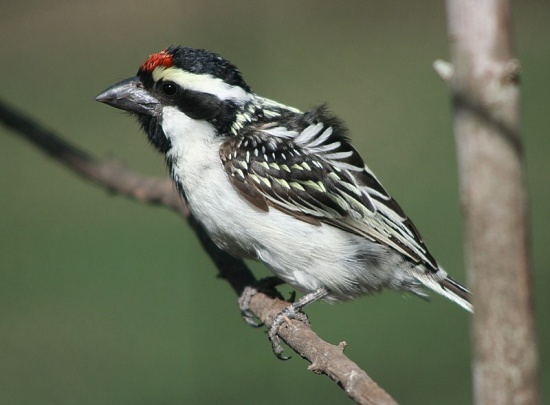- Tricholaema leucomelas
Identification
Length 17-18 cm; mass 23-39 g.
Adult: Head boldly marked with a red forehead, black crown, central nape, eyestripes, and throat; the eyebrow is yellow and white. Upper parts largely black with yellow markings; wings black with white and yellow. Under parts white to yellowish white and pale grey. The bill is black, the eyes dark brown, and the legs and feet blackish.
Within its range, there are no other barbets of a similar size with the bold head pattern. The Yellow-fronted Tinkerbird, Red-fronted Tinkerbird, and Yellow-rumped Tinkerbird are superficially similar, but much smaller, and the Miombo Pied Barbet lacks the black throat (and is found only north of the range of the Pied Barbet).
Distribution
Southern Africa: South Africa, Namibia, Botswana, Zimbabwe, Swaziland, southern Mozambique, the Lesotho lowlands, southern and western Angola, and southern Zambia.
Taxonomy
Tricholaema leucomelas has three subspecies varying in plumage colouration and size:
- T. l. leucomelas from the south-western part of the range (South Africa only);
- T. l. affinis from eastern South Africa, Lesotho, Swaziland, southern Mozambique and eastern Zimbabwe.; and
- T. l. centralis from Namibia, Botswana, north-central South Africa, western Zimbabwe, southern and western Angola, and southern Zambia.
Habitat
Semi-arid savannas, especially those dominated by Acacia. Also gardens, orchards, fynbos and grasslands with exotic trees.
Behaviour
Single or in pairs. Forages mainly for fruit, especially figs and mistletoe. Also eats insects, nectar and petals.
Breeding: Monogamous and territorial. Nest hole excavated by both adults in dead tree stems (9-12 cm in diameter), usually 1-3 m above the ground. Nest holes are sometimes reused. Swallows nests and woodpecker nests may also be used, but this behaviour is rare. Two to four eggs are laid August to April. Both parents feed nestlings. Parasitised by Lesser Honeyguide and (rarely) Greater Honeyguide.
References
Hockey PAR, Dean WRJ & Ryan PG (eds) 2005. Robert's Birds of Southern Africa, 7th edition. John Voelcker Bird Book Fund, Cape Town, South Africa. ISBN 0620340533




